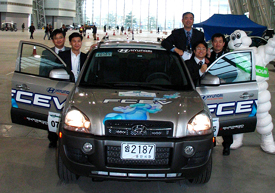Dec 12 2007
Hyundai Motor Co.'s Tucson Fuel Cell Electric Vehicle (FCEV) triumphed in this year’s Challenge Bibendum held in Shanghai from November 14 to 17. Competing against teams from Daimler AG, GM, Nissan, Tucson FCEV was the only fuel cell electric vehicle to get a perfect score.
"This result once again confirms that Hyundai´s fuel cell technology is among the front-runners in the industry," said Kwon Moon-Shik, Hyundai’s senior executive vice president responsible for advanced technology. Team Hyundai scored victories in previous editions of the Challenge Bibendum.
Challenge Bibendum, created by Michelin in 1998, is a competition for the promotion of sustainable road mobility which covers four performance test parameters: noise, fuel efficiency, pollutants and CO2 emissions.

Introduced in 2004, the Tucson FCEV is Hyundai´s second generation fuel cell electric vehicle. It can reach a maximum speed of 150km/h and has an operating range of 350km using a hydrogen storage tank pressured at 350 bars. The heart of this 21st century vehicle is a 80kW fuel cell stack developed by Hyundai.
Hyundai is currently operating two fuel cell test fleets, one in the United States and one in Korea. Hyundai is partnering with UTC Power, Chevron Texaco and the U.S. Department of Energy in a program which calls for the supply of 32 fuel cell vehicles. In Korea, Hyundai is supplying the government ministries and agencies with 34 fuel cell vehicles, including four buses.